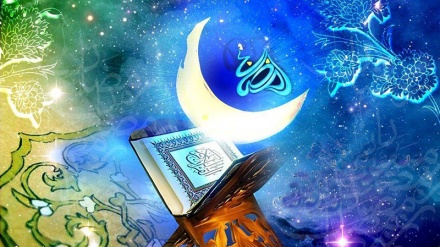Blessed Month of Ramadhan
Welcome to the 10th episode of the series “Blessed Month of Ramadhan”. We have reached the 10th day of the blessed month of Ramadhan. Hopefully, you have experienced beautiful spiritual developments in this month when the fasting persons are the Guests of God at the Divine Banquet.
Fasting, especially the obligatory fasts of the blessed month of Ramadhan, washes away whims and carnal desires. In the light of purity and chastity, resulting from fasting, those who fast, in addition to avoiding eating and drinking during the daylight hours, try to keep the eyes, ears, tongues, and other parts of their bodies from committing whatever God has forbidden us, in order to reach an elevated status of piety that even refrains from thinking about committing sins. The Commander of the Faithful, Imam Ali (peace be upon him) noted: Fasting in which one’s soul avoids contemplation on commitment of sins is superior to the level of fasting in which the related individual only refrains from eating and drinking.
This doesn’t mean that we should not refrain from eating and drinking for a number of known hours. This remark of Imam Ali (AS) intends to show that we should also try to gain spiritual experiences from fasting, in addition to refraining from eating and drinking for a number of hours in the blessed month of Ramadhan.
Today is the anniversary of the passing away of Omm al-Momineen the Mother of all True Believers Hazrat Khadija (peace upon her), the loyal and selfless wife of 25 long years of the Almighty’s Last and Greatest Messenger, Prophet Mohammad (blessings of God upon him and his progeny).
As the First Lady of Islam, Hazrat Khadija (peace upon her), always assisted her husband, with her vast wealth, during that tough and critical phase of Islam, when the Muslims were persecuted by the pagan Arabs. She was beside the Prophet throughout all hardships and allocated all of her wealth for the advancement of religion of Islam, to provide food, clothing and shelter to the fledgling Muslim community. She maintained excellent ethical virtues and was highly prudent and wise, such that even in the pre-Islamic era, she was known as a chaste and innocent woman. During the three years of the social-economic boycott of the Prophet and the Muslim community, when the Prophet’s beloved uncle and guardian, Abu Taleb took the Muslim community under his protection at gorge still known as Sha’ab Abi-Taleb outside, it was the wealth of Hazrat Khadija (peace upon her) that provided vital sustenance. All her wealth was spent in this way with no inheritance left for her only surviving child, daughter Hazrat Fatema Zahra (peace upon her).
The Prophet of Islam, despite taking several spouses in the last ten years of his life, out of social necessity and the need to break the taboos of the days of ignorance, used to cherish the memory of his beloved wife Khadija:
“Never did God give me a better wife than her. When people didn’t believe in me, she believed. When people belied me, she confirmed me and when they didn’t support me, she supported me by her properties and the Almighty and Glorious God granted me children by her while I did not have children by other women.”
In Ayah 54 of Surat-al-Ma’idah of the Holy Qur’an, God Almighty says:
“O you who have faith! Should any of you desert His religion, Allah will soon bring a people whom He loves and who love Him, who will be humble towards the faithful, stern toward the faithless, waging jihad in the way of Allah, not fearing the blame of any blamer. That is Allah’s grace which He grants to whoever He wishes, and Allah is All-Bounteous, All-Knowing.”
This ayah points out that God is needless of deceitful people; those who claim to be Muslims, while in the heart they don’t have faith, and their actions are against the spirit of Islam. For the sake of materialistic interests, they oppose God and the Prophet of God and maintain friendship with the enemies. Such individuals gradually completely derail from the right path. So God, at the start of this ayah and as a general principle, notes that those who claim to have faith but then desert religion, would not be able to harm God and Islam, and Allah will soon replace the apostates with those whom God loves, and who in turn love Him. Meanwhile, those who are firm and true believers, maintain special features. They are modest and humble toward the faithful and are stern toward the faithless and will show not even an iota of flexibility toward the enemies and the unjust. They also wage jihad in the way of Allah and do not fear the blame of any blamer in compliance with divine instructions and in defense of the righteousness and truthfulness.
The true faithful, whom God has referred to, in this ayah, are courageous individuals, who are fearless in their efforts to end wrong traditions and to oppose a majority that has derailed from the righteous path. At the end of this ayah, it is stated that this is Allah’s grace which He grants to whoever He wishes, and Allah is All-Bounteous, All-Knowing.
Now, let’s speak of a healthy dietary regimen, especially in the blessed month of Ramadhan. If a dietary regimen would be regulated based on scientific principles and with due consideration of body’s needs it would lead to one’s health. Otherwise, it would distort the performance of body systems and would deteriorate the physical and mental health of the individual. Focus on Halal and Haram food is in line with this principle. A balanced and appropriate diet leaves more positive impacts on the human soul. Thus, Holy Qur’an invites everyone to consume Halal food, while blaming those, who deny themselves of some of the Halal food.
Ayah 32 of Surat al-A’raf of the Holy Qur’an states:
“Say, ‘Who has forbidden the adornment of Allah which He has brought forth for His servants, and the good things of His provision?’
Today, it is observed that some individuals, in order to lose weight, adopt wrong plans and do not eat sufficient food. This group of people find the blessed month of Ramadhan as a better opportunity for reaching this goal. However, in the view of the science of medicine, this group of individuals, who do not appropriately respond to the needs of their body cells and who deny themselves of some halal foods are always ill.
Meanwhile, God, in Holy Qur’an, in addition to recommending Halal food, warns against Haram food. Haram food is the one which has been earned through illegitimate channels, such as overcharging, theft, usury, and/or robbery of the treasury. In appearance, Halal and Haram food are no different. However, Haram food is a major impediment to mankind’s development and growth. Prominent religious figures have also warned against the consequences of Haram food on mankind’s body and soul, noting that Haram food pushes the individual toward commitment of sins.
Seminary and University Lecturer, Hojjat al-Islam Mahdavi Nia, notes: “Haram food wipes out blessings, leads to rejection of prayers, escalates the incentive for commitment of sins, and begets callousness. For instance, during the Immortal Epic of Ashura in Karbala, before his martyrdom, Imam Husain (AS), the Prophet’s younger grandson and 3rd Infallible Heir, told the Godless troops of Omar ibn Sa’d that the reason they have become blind to the realities and their ears are not ready to listen to the truth, is that they stomachs are filled with Haram food, that is, food consumed through illegal and unlawful means.
AS/ME


